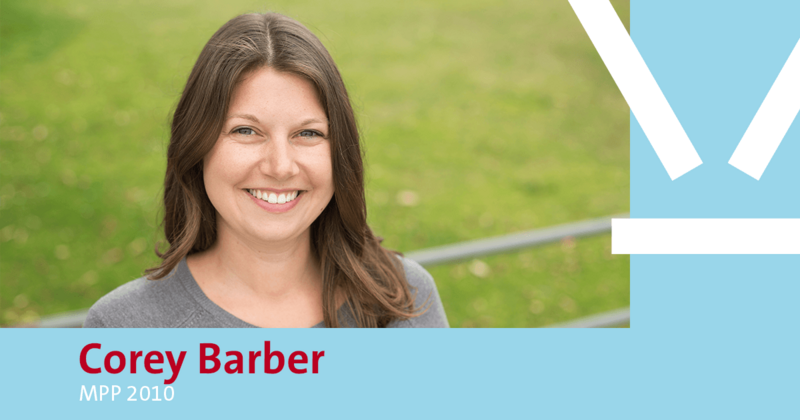
Corey Barber explains how she found her place in work and life over the last decade.
Corey Barber (MPP 2010) joined the Media and Communications department of the European Center for Constitutional and Human Rights in 2019. She also owns Barbershop Communications, a public relations company focused on policy, healthcare and the non-profit sector. In addition to her MPP from the Hertie School and a Bachelor of Arts in International Relations and Modern Languages from Beloit College in Wisconsin, she has studied in Peru, Spain and Russia. She has worked in the public relations, human rights, international development, and healthcare sectors since 2010.
It has been 10 years since you graduated from the Hertie School. What have you been up to over the last decade?
I’ve been finding my place in work and life. I’ve stayed in Berlin for eight of the last 10 years where I’ve worked in non-profit and corporate public affairs and public relations. I spent a year in Portland, Oregon, and a year in Los Angeles, but realised I missed life in Berlin. In 2019, I started a communications business. I also work part-time at the European Center for Constitutional and Human Rights, where I did my Hertie summer internship and about which wrote my MPP thesis. It’s been thought-provoking to reflect on how ECCHR and I have grown over the past decade. I also have two young daughters who keep me busy.
How has the Hertie School – and its network and community – helped you in the career path you have chosen?
I originally found ECCHR through my Hertie School Professor Alexander Graser who recommended it, and I’m sure his connection there helped me land the internship. I’ve connected with Hertie graduates at nearly every organisation I’ve worked, which is always a pleasant surprise. I’m very excited to participate in Hertie’s new Recharging Advocacy for Rights in Europe programme that will connect me with other human rights defenders around the continent.
The Hertie School absolutely helped me become a better (and more concise) writer, learn how to communicate with and understand people working in diverse fields, and navigate the German labour market. It’s helpful to know that, especially in Germany, there are Hertie School grads in every field I’d be interested in working in. I’ve always felt comfortable contacting people in the Hertie network that I don’t know personally to ask their take on a certain work-related issue, if I’m thinking about a job change, etc.
Looking back at your time at the Hertie School, what are some of your fondest memories?
I have many fond memories of Hertie. One that is on the top of my mind these days is watching the 2008 American election with other students in the cafeteria. I had campaigned to get out the vote with Americans abroad and was very passionate about trying to get Obama elected. My classmates’ interest, energy and support was wonderful. We had a fun, long night.
What was your favourite class and its key takeaway that stuck?
I took an excellent comparative law class with Professor Nico Krisch where we looked at various countries’ Supreme Court rulings, and examined how the US Supreme Court’s composition and decisions have changed over time. I think that was the first time I realised that the Supreme Court – and the law – are deeply political.
I also loved public management courses with Professor Kai Wegrich and often think about the theories we learned to analyse and evaluate decision-making. These lessons pop into mind whenever I run into annoying or inefficient bureaucracy, which is more often than I’d like.
If you could go back in time, what would you tell your younger self on your first day at Hertie?
Relax and have fun. Study hard but enjoy your time as a student. You will find a job after graduation. It might take longer than you hoped and not be exactly what you envisioned. If it’s not the best fit, you can find another job. As Pattie Sellers wisely said, “careers are a jungle gym, not a ladder.”
Is there any piece of advice you would like to share with current students and fresh graduates?
This is advice I’ll give myself as well.
1. Hang in there. Studying and graduating amid a pandemic are serious challenges. You will get through this. If you are having a hard time, don’t be afraid to reach out for help. Doing so is a sign of strength, not weakness. Depending on the challenges you’re facing, talk to your classmates, professors, or student and alumni services. It doesn’t feel like it, but this pandemic and weird period in our lives will end.
2. Don’t fall into the trap of comparing yourself to others. It doesn’t make you feel any better or change anything. Work on yourself instead.
3. Be a life-long learner. There is always something interesting you could learn more about. Education can take many forms – I like reading novels with characters who are quite different from me, and look forward to travelling when that is possible again.
4. Think about those who are less privileged – volunteer your time if you can. Many people are really struggling, and not just in the pandemic, which has exacerbated existing inequalities. Helping others can also help you feel better.
In this series, we talked to Hertie School alumni who graduated ten years ago. We asked them to reflect about their time in Berlin and to share with us where their path took them afterwards.
The Hertie School is not responsible for any contents linked or referred to from these pages.
Views expressed by the author/interviewee may not necessarily reflect the views and values of the Hertie School.
